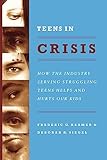Teens in Crisis : How the Industry Serving Struggling Teens Helps and Hurts Our Kids / Frederic G. Reamer, Deborah Siegel.
Material type: TextPublisher: New York, NY : Columbia University Press, [2008]Copyright date: ©2008Description: 1 online resource (192 p.)Content type:
TextPublisher: New York, NY : Columbia University Press, [2008]Copyright date: ©2008Description: 1 online resource (192 p.)Content type: - 9780231144636
- 9780231514507
- 362.7083 22
- HV741 .R415 2008
- online - DeGruyter
- Issued also in print.
| Item type | Current library | Call number | URL | Status | Notes | Barcode | |
|---|---|---|---|---|---|---|---|
 eBook
eBook
|
Biblioteca "Angelicum" Pont. Univ. S.Tommaso d'Aquino Nuvola online | online - DeGruyter (Browse shelf(Opens below)) | Online access | Not for loan (Accesso limitato) | Accesso per gli utenti autorizzati / Access for authorized users | (dgr)9780231514507 |
Frontmatter -- CONTENTS -- 1. The Invention of "Troubled Teens" -- 2. The Struggling-Teens Industry -- 3. A Legacy of Scandals -- 4. Helping Struggling Teens -- 5. A Blueprint for Reform -- Glossary -- Notes -- References -- Index
restricted access online access with authorization star
http://purl.org/coar/access_right/c_16ec
In recent years a dizzying array of programs has emerged to meet the needs of struggling teens and their families-wilderness therapy programs, therapeutic boarding schools, alternative schools, mentoring and court diversion programs, independent living programs, and myriad day treatment and partial hospitalization services. Yet not all of these offerings employ mental health professionals or follow evidence-based treatment protocols. Some programs are licensed and accredited, but many are not, and some use techniques that are highly controversial, even abusive, resulting in injury and accidental death.Frederic G. Reamer and Deborah H. Siegel have written the first scholarly book on this influential and controversial industry. They begin with a time line of Americans' changing attitudes toward challenging teens and the programs and schools established to handle this population. Then they summarize reputable organizations, including a selection of community-based and residential programs and schools, and provide brief descriptions of typical services. The authors candidly discuss a number of troubling scandals and tragedies, exposing the tragic consequences of emotionally and physically abusive practices, and recommend a range of empirically sound interventions for the clinical challenges of adolescent depression, bipolar disorder, anxiety, oppositional behavior, eating disorders, and attention-deficit/hyperactivity disorder. The authors conclude with a blueprint for reform and twenty "best practice" principles relating to harm prevention, program-based discipline, industry regulation, quality assurance, parental involvement, staff education, and after-care services.
Issued also in print.
Mode of access: Internet via World Wide Web.
In English.
Description based on online resource; title from PDF title page (publisher's Web site, viewed 02. Mrz 2022)


